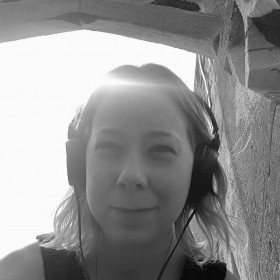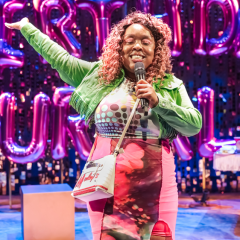You will also usually be the only producer working on a project and you will be the one that people come to with questions. When I first started producing shows though, I found that I often wanted someone I could ask questions too. So this is my ‘frequently asked questions’ guide for theatre producers, or if you’re a theatre company, actor or script writer and you’ve ended up producing your own shows.
Contents
I have an idea for a show. How do I start?
I have written a play/I am making a show. How do I find a producer?
How can I find funding for my show?
What insurance do I need and who would you recommend?
How much should I pay people? How much do producers charge?
How do I set up a theatre company and are there templates I can use for registering different types of organisation?
How do I find example contracts?
How do I contact venues and get a show out on tour?
What do I send to programmers at venues?
How much should I charge for my show?
How can I find other producers and get advice?
I have an idea for a show. How do I start?
Theatre is collaborative and talking through ideas helps bring them to life. You don’t have to go from 0 to 100 in one go i.e. you don’t have to take your idea and try and stage a full show and tour.
Start off with some time with other people in a room to try out ideas and get them on their feet. Think of the process as a series of stages or prototypes e.g. you have an idea and test it, you develop the idea a bit further into a short extract to share as a work in progress to an invited audience, or have a rehearsed reading of a script to get an audience response. You might then do a more developed extract at a work in progress or platform event, followed by a preview at a fringe festival.
Touring can also be in two stages – often a small tour or preview tour can help you get a much more extended tour on the road the next time around.
If you don’t have an existing company to work with, try arts networking events to meet other creatives or doing a call out on local creative network social media pages.
House have a useful resources page to help with the practical elements of starting out: http://housetheatre.org.uk/resources/
I have written a play/I am making a show. How do I find a producer?
The relationship between producer and writer, artist or company works best when it’s exactly that: a good relationship. It’s great when both parties have enthusiasm for and commitment to the show and work well together.
It’s worth taking the time to find the right person and get the relationship right. Producers tend to have a specialism of the kinds of shows they work on and the type of work they are enthusiastic about, and if you get the right person for your show they will have more knowledge of what is needed to make it a success.
Where possible it’s therefore worth taking the time to meet different producers and to give them the opportunity to see your work in action. If that’s not possible, be sure to give as much information about the show and role as you can.
When posting producer jobs i.e. you have a fee available and something specific in mind, make sure you provide information about the show (content, stage the show is at, style/ scale of work, image if you have one) and the role i.e. is it to get a show from page to stage or is it to book or manage a tour? And then provide a link to where they can get more info/read more about your work/see your work in action.
If you are at an earlier stage than this, here are some things you can do to meet producers and have those conversations:
- Look at websites for theatres in your area who offer artist development
- They often have networking events where you can meet people and ask for recommendations. Sign up to their mailing lists to be updated about opportunities and follow them on social media.
- Lots of theatres and artist support organisations will also do ‘open office’ sessions where you can ask for advice and recommendations
- Check out the websites of venues and organisations who programme the kind of shows you want to make and see what support they might be able to offer. Large scale commercial theatres are less likely to offer this kind of support.
- Share what you have so far at work in progress nights/ scratch nights
- Again look at theatres near to you who do artist support and look for call outs on Arts Jobs and Arts News http://www.artsjobs.org.uk/
- Join local creative Facebook groups/ networks and see if anyone wants to go for a coffee and chat about your show
- Conversations are almost always the best starting point
How can I find funding for my show?
Arts Council England’s (ACE) project grants are one of the few funding streams for creating new shows, research and development (R&D) of a new show, and touring shows. They have a huge amount of helpful resources online, including information sheets, videos, how-to’s etc. You could start by looking here: https://www.artscouncil.org.uk/projectgrants
Other than ACE, there are not very many funders where the art is the main focus. For most funders there needs to be a strong social or community benefit because it’s charitable money. If your project includes workshops, community engagement, educational aspects etc. then you could look at applying to other funders such as Lottery Funding, trusts, and funds provided by banks and businesses (who knew Greggs - of sausage roll fame - also has a charitable fund you can apply to for community projects for example?!).
Contact your local voluntary sector support organisation and see if they have a database you can search, or a funding mailing list you can sign up for. Some also offer funding information workshops. I’ve written a more detailed article on applying for funding on Voice, which you can read here.
Other ways to find suitable funders are:
- Look at similar shows and projects and see who funded them, then look those up (lots of funders have websites explaining who and what they fund)
- Join mailing lists or follow arts and voluntary sector support organisations and look for funding announcements
You can also sign up to search the funding database on Funding Central.
Most projects are funded from a combination of sources. Other sources of income include:
- Earned income e.g. ticket income, fees for shows
- Individual giving e.g. individuals making donations
- Support in kind e.g. organisations and businesses providing things for free that you would otherwise pay for e.g. rehearsal space or printing
- Business sponsorship (tricky in the current financial climate, but may be possible with businesses local to you where there might be a link to the type of project you’re doing)
- Seed funding or commissions from arts organisations who want to support projects
- Again, get on their mailing lists, follow them on social and look for call outs)
- Crowdfunding
- I’ve published an article on Voice around crowdfunding, which you can read here
What insurance do I need and who would you recommend?
For most tours you need public liability insurance (PLI) to cover legal costs if you do something which causes an accident for an audience member, for example; employers liability (to cover legal costs if you instruct a cast or crew member to do something which causes them an accident) and insurance to cover damage or loss to hired equipment, your set, and so forth. Many venues will ask to see a copy of your PLI.
Advice may vary as to whether you need employers liability insurance if your cast and crew are freelance, but if you’re instructing what and how they do things and/or if you work with volunteers then you should have it.
To get a quote you’ll need to be able to provide information such as the replacement value of any equipment. Hire companies can provide this for equipment, and you can use your show budget or advice from a designer to estimate the replacement costs for a touring set.
There are a few companies who specialise in this kind of insurance and you can apply for a quote online to compare prices. Simply search ‘Theatre Producer Insurance’ online, and be sure to get quotes from more than one to check value for money. If you’re working with a not-for-profit organisation or charity then insurers who specialise in these areas may be able to provide comparable cover but at a lower price.
If you’re a member of Equity, BECTU, Artist Network, or other such union or organisation, you can often get good insurance deals through them, or it might be included in your membership.
How much should I pay people? How much do producers charge?
The ITC (Independent Theatre Council) have a ‘rates of pay’ page on their site. Musicians Union and the Writers Guild and other Unions will have similar rates of pay pages for roles not covered on the ITC page.
Often you’ll be working on a project which doesn’t meet the criteria of the standard agreements e.g. you may be devising a play in rehearsal with a writer in the room for part of it, and so you’ll have to use a combination of the recommended rates of pay, what your collaborators normally charge for their work, what the project can afford, and what is fair for the amount of time someone is putting in.
There isn’t a standard day rate set for actors for rehearsals or shows (just a week rate). You can calculate a day rate by dividing the week rate by the number of days they’re working, but that should really serve as a minimum rate. Where possible, anything between £100 and £150 per day for someone’s time (if they’re only needed for one or two days in a week) is often suggested to compensate for the fact that they don’t have a full week’s work.
If you’re starting out, you may not be able to offer standard rates. If that’s the case make it clear to everyone from the beginning what the financial situation is and try to be fair about what you ask of people. For example, if you can’t pay people a lot for their time, then being flexible on rehearsals so they can still work elsewhere, or keeping things short and sweet and doing a work in progress until you can secure funding for the project.
Producers usually have a standard day rate they work to and will provide an estimate of how many days they think are needed for your project.Their day rate will be based on their level of experience and the type of work, and can be anywhere between £100 and £250 per day. £150 a day comes up a lot when this question is asked, so is a good starting point for budgeting. Some producers work on a fee per project, calculated depending on the scale of the project, or a percentage of the total budget (often 10-15%), and others work on the ITC rates for administrators.
How do I set up a theatre company and are there templates I can use for registering different types of organisation?
You don’t have to have a legal structure for your company, particularly when you’re first starting out, and can still do pretty much all the things you need to do to tour a show. You would simply need to be registered and operating as a sole trader (self employed) to inform HMRC about your earnings. Voice has a great article about being self-employed that you can find here.
If you’re making a show for the first time and/or working with a group of people for the first time it’s far better to try it out first before committing to running a company or charity. I work as a self employed producer for a range of self employed artists, or ‘companies’ who are simply a collection of self employed people and have no intention of setting up an official company, and it’s never been a problem. You can still have a company name, website, logo and brand if you want to.
Setting up an official company can give you greater legal protection, and demonstrates to other organisations working with you that you are ‘official’, which increases your credibility. If you’re scaling up your work it can also be useful in terms of opening up the range of funders you’re eligible to apply to, as well as dealing with tax.
ITC run a useful course on setting up a company pretty regularly and at quite a reasonable rate: https://www.itc-arts.org/training/timetable/122-starting-a-performing-arts-company
You can also search for your local business start up support. There’s loads of free support for new businesses, and even specific creative business support – all of which can be really useful with setting up an arts company.
If you decide you do want to set up a company, the most common options for arts companies are:
- Company Limited by Guarantee (can have a not-for-profit structure)
- Community Interest Company (social enterprise)
- Registered Charity
This page has some useful info on the differences and what they mean:
https://www.resourcecentre.org.uk/information/legal-structures-for-community-and-voluntary-groups/
Again, your local voluntary sector support organisation or local business start up support can advise as to what might be best. The pros and cons usually come down to the amount of administration required for each, what types of funding you are then eligible to access, and the types of activities you want to undertake.
If you have decided you want to set up a particular kind of company then there are lots of model templates available online to create your governing documents. It’s worth getting advice on this too, but the model documents make the process simpler (and if you’re paying for help then having a document to start from makes it cheaper).
These ones are approved by Companies House/ Charity Commission and so although you can make some amends to tailor it to your organisation, using model articles and documents makes the registration and approval process easier.
- Charity model documents
- Company Ltd by Guarantee model articles
- Community Interest Company model constitutions
How do I find example contracts?
ITC provide model contracts and lots of support for their members on contracting, guidance on pay, and more. Membership for an individual is £180 + VAT per year, which can be a lot if you’re just starting out, but it does give you access to lots of downloadable resources you can use for the future. You can see a list of what you get here.
House Theatre have a simple example agreement for freelance technicians. They also have a sample artist contract if you search on their Resources for Companies page.
Ask the people you’re working with if they have contracts from previous jobs they could share with you. Always make sure any terms you include in any contract are applicable for your particular project.
In essence a contract is simply an agreement of what each party will provide so in the absence of anything else an email clearly stating the following is better than nothing:
- What the role is and what is expected from it
- Be specific, for example, does it include operating lighting as well as stage management? is it just set design or build and delivery as well? Will actors be required to assist with anything else whilst on tour? Is filming included?
- What the dates and schedule are
- What the fee is, when it will be paid (payment schedule) and what’s covered (e.g. travel? accommodation? subsistence?)
The main issue which arises with contracts is when the person you are contracting expects one thing and you expect another. Whatever documents you use, make sure everyone agrees, and it is captured in writing, what is expected of both parties.
How do I contact venues and get a show out on tour?
There isn’t a comprehensive list of venues or, as far as I am aware, an open database of venue contacts, both for data protection reasons and also, more simply, because venues differ hugely. As such, one person’s database is not necessarily going to be any use to someone else.
The venues you contact will be based on:
- Which venues are in the geographic area, and are practical and financially viable for you to tour to
- Which venues have the space you need and a suitable capacity for your show
- Which venues programme the kind of show you are making
When researching venues to contact for booking, you should do the following things:
- Make a list of your criteria for venues- what kind of thing are you looking for to start to narrow it down, for example, “studio spaces of up to 100 seats in the South West and West Midlands that programme spoken word/storytelling/contemporary theatre”
- Find shows and companies that are similar to yours and look at where they tour to start to build your list
- Create a tour booking database personalised to your show using venue websites and contacting venues to get the name and contact details of the programmer. There might be someone with programmer in their job title, or if not this might be done by the artistic director. Small venues might have one person who does everything. Check if the venue give any information about how they programme – some have a specific way they want you to send them information.
There are a few places where you can find information about venues by region:
- Routes In: you can download this guide about venues in the North of England here: https://arconline.co.uk/venues-north
- Venues South West: https://www.wiltshirecreative.co.uk/artist-development/vsw/
- House Network: venues in the South East and East of England who are part of the House programming network: http://housetheatre.org.uk/venues/
If you’re starting out and it’s a new company and a new show, it can be tricky to get booked by venues. There are a few things you can do:
- look for fringe festivals, platform events and showcases where you can submit your show, then use the opportunity to invite programmers, get reviews and audience feedback etc.
- If a venue you’re interested in offers artist development opportunities then sign up to their mailing list, attend their events, get to know the staff there and start to build a relationship so you’re not contacting them cold when you start tour booking
- Invite programmers to see work in progress or previews. A lot of venues don’t programme just from emails, they want to see the work first. If you are doing a work in progress sharing in a venue, invite staff from that venue personally and try to begin a conversation, but also invite others from nearby venues.
Remember that most venues work about six months ahead, so you need to plan about a year in advance. For example, if you want to do a spring 2021 tour, venues will be booking their spring season usually in summer 2020 (some into early autumn) so ideally you will need to get the show to a stage where you can take good production shots, make a trailer, get some feedback - and ideally some reviews - for your tour pack by spring 2020
There’s a great blog post on how to tour from A Younger Theatre.
What do I send to programmers at venues?
Most companies will send a tour pack to programmers which usually contains some or all of the following:
- Information about your show – What is it about? What style is it?
- Information about the audience for the show and an age range if it’s a children’s show
- High quality images and a link to a trailer
- Quotes from reviews or audiences
- The technical requirements for the show e.g. playing space required, length of get in, number on the road
- Keep this brief! You can send a full tech spec for the show at a later stage if needed
- Information about who the team behind the show are
- Contact details for more info
Derby Theatres have a great info sheet on this here:
You can also search ‘tour pack theatre’ ‘promoter pack theatre’, ‘tour pack dance’ etc. to see lots of examples online from experienced companies.
When you are putting together your tour pack, think about what the programmer wants to know. Resist the urge to write two pages of text on the artistic vision and themes behind the show and think practical. What is the show? Is it a dark comedy? Is it a fast paced family show with live music? Keep it simple and clear and in plain English. The programmer needs to be able to understand exactly what’s going to be on stage, what audience they can sell it to and how. As much as programmers love theatre for its own sake, they also need to be confident they can sell a show.
How much the show costs can sometimes be included in the tour pack, but often this is left to a conversation/negotiation between you and the programmer if they are interested.
How much should I charge for my show?
Work out what you need to charge to cover the costs of touring the show, remembering things like marketing materials, travel, admin, tour producer time, a proportion of any company overheads, as well as the costs of paying the team on the day. You may or may not have some funding towards these costs.
This then needs to be balanced by what venues are prepared to pay for the type of show you are offering. Fewer venues are prepared to offer fees and may offer you a box office split instead. For regional touring this is often a 70/30 split in favour of the company, sometimes a 60/40 split. When negotiating, if you can show a venue how they’re likely to sell a lot of tickets for your show you might be able to push them up to an 80/20 for example. In London venues they seem to often start at 50/50 splits or try and charge you to hire the venue.
There’s a good explanation of fees, box office splits and guarantees from Theatre Bristol.
If you’re asking how much companies charge as a fee for a show people usually say it’s a ‘how long is a piece of string question’, but here are some ballpark figures because although it varies a lot but it’s still within a range.
For small scale touring e.g. studio theatre shows, regional venues etc most shows are priced between £400 and £1500 per show. What you can charge within this depends on the type of show and the reputation and track record of the company.
Rural touring, new companies with no track record, small scale one person shows are going to be towards the lower end of this. Shows for the main house of smaller regional venues, established companies who have a track record of selling well, shows with known writers, directors etc are going to be towards the higher end of this.
Your formula should basically take what you need to charge to cover your costs, what you can reasonably charge given the type of show and track record and then you need to come to a figure which takes both of these into account. That is then your starting point for negotiations with venues.
Remember that if you have a 70/30 split for example, you will need to estimate how much you will get from this and you usually need to take VAT off the top first, before you get your 70%. I have created a split calculator here which might help: https://www.christinapoultoncreative.co.uk/resources
How can I find other producers and get advice?
The UK Theatre Producers Facebook group is a great place to start and is designed for exactly this. You can search the group for your question as many will have come up before and you can also post asking for specific advice.
There are various producer meetups and events promoted here too. Some of these include Producers Pool, Producer Gathering and Producers Place.
If you can’t find any meetups near you, try contacting your local theatres and seeing if they already host them, or would be willing to. Producing can sometimes seem like a lonely job because you are the one keeping all the plates spinning, so make time to talk to other producers and share your experiences and remind yourself of why you’re doing this brilliant, amazing job in the first place!








0 Comments